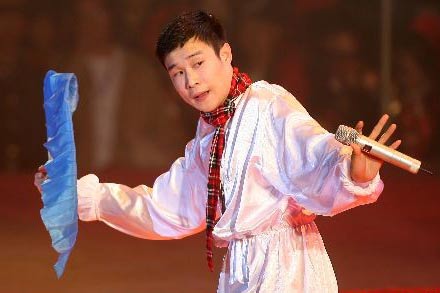中國(guó)男生娘娘腔!?可能很多男生會(huì)跳出來跟小編大吵了。但看著電視上越來越多性別不明、男女不清的偶像,真是讓人不得不擔(dān)憂起來。最近一名教授就出書立作,證明中國(guó)男生的成長(zhǎng)環(huán)境,的確很可能把他們變成娘娘腔……
Chinese boys between the ages of 7 and 17 are 2.54 cm shorter than Japanese boys. Chinese boys are getting physically weaker. Chinese boys are now emotionally more vulnerable than girls.
7至17歲中國(guó)男生比同年齡的日本男生矮2.54厘米;中國(guó)男生體質(zhì)越來越弱;中國(guó)男生在情感上比女生更容易受傷。
The above are all claims made by a new book, "Save the Boys," that has one simple warning for Chinese society: our boys are becoming more girly. A combination of popular culture and an education system that in hibits masculine development is to blame, it adds.
以上這些言論都出自新書《救救男孩子們》——該書警告中國(guó)社會(huì):我們的男孩正在變得越來越娘娘腔。混合的流行文化和我們的教育體系正在扼殺男生們男子氣概的發(fā)展。
Unequal education
不公平的教育
"We have talked so much about equal education for men and women in the past decades," says Sun Yunxiao, author of the book and a professor at China's Teenager Research Center, "but we neglected the fact that boys and girls should be educated differently at school."
該書作者孫云曉(音)是中國(guó)青少年研究中心的教授,他說:“在過去的幾十年里,我們談?wù)摿颂嚓P(guān)于男女要受平等教育的問題,但我們忽略了男生和女生其實(shí)在學(xué)校里應(yīng)該接受區(qū)別教育。”
Sun'sbook reveals how China's education system, which centers on exams, is a major disadvantage for the growth of boys. "Boys have to stop being boys in schools; they have to sit still and be obedient. Boys with poor performances in exams feel discouraged by their educators and this has a negative impact in their self-esteem," says Sun.
孫先生的書探討了中國(guó)的教育制度過于集中于考試,是阻礙男生成長(zhǎng)的主要不利因素。“男生們?cè)趯W(xué)校里都不能當(dāng)‘男生’了!他們必須乖乖坐著、好好表現(xiàn)。在考試中表現(xiàn)不好的男生得不到老師的鼓勵(lì),這對(duì)于他們自信心的成長(zhǎng)是不利的。”
According to "Save the Boys," the traditional Chinese method of 'caged breeding'raises a child like a little emperor and doesn't encourage in dependence. Further more, "the frequent absence of a father figure andthe over protection of the mother is another factor that makes Chinese boys more feminine。"
《救救男孩子們》一書中還提到,傳統(tǒng)中國(guó)式的“圈養(yǎng)”教育把孩子當(dāng)做小皇帝養(yǎng),并且不鼓勵(lì)孩子獨(dú)立。更進(jìn)一步,“父親形象的經(jīng)常缺失、以及母親的過分保護(hù)都使得中國(guó)的男生越來越女性化。”
Add in China's lack of male educators and the book has a strong argument: Chinese boys are developing in a predominately female environment.
書中還有一個(gè)強(qiáng)烈的觀點(diǎn):中國(guó)的早期教育缺少男性老師,因而中國(guó)男生是在一個(gè)女性掌控的環(huán)境中成長(zhǎng)起來的。

Pop culture influences
流行文化的影響
The book also leaves blame for the change in China's males on the doorstep of Chinese popular culture. In recent years the pop culture industry, especially TV talent shows, has produced icons (Li Yuchun, for example)that blur the man/woman divide.
書中同時(shí)還認(rèn)為中國(guó)流行文化改變了男性的形象。在近年來的流行文化工業(yè)中,特別是電視真人秀節(jié)目,制造了很多模糊男女差別的角色。
According to the "Save the Boys," when Chinese boys grow up they imitate these gender-ambiguous pop culture influences instead of trying to take on more traditional male roles.
該書認(rèn)為,在中國(guó)男孩的成長(zhǎng)過程中,他們會(huì)模仿這些性別模糊的偶像、受流行文化的影響,而不是試著扮演更多傳統(tǒng)的男性角色。
What will create these masculine men that "Save the Boys" is looking for? Sun writes on his blog, "In order to have Chinese boys grow up to be real men, they need to participate in sports."
那么到哪里去尋找《救救男孩子們》書中所期待的“真男人”呢?孫先生在他的博客里寫道:“為了使中國(guó)的男生們變成真正的男人,他們應(yīng)該多運(yùn)動(dòng)。”
The "Save the Boys" debate
關(guān)于“救救男孩”的爭(zhēng)論
Sun's book has spurred arguments around the country about young Chinese boys' development. Professor Yuan Jun from Shanghai Normal University's Psychology department is one of the loudest voices against Professor Sun's theory. "Although gender-neutral men often win talent shows, it doesn't meanboys will imitate their behaviors. These men are just a few of the icons that young boys see."
孫先生的書在國(guó)內(nèi)引起了關(guān)于男生成長(zhǎng)的諸多討論。來自上海師范大學(xué)的袁軍(音)教授就非常反對(duì)本書的理論。“盡管中性的男人經(jīng)常贏得真人秀,但并不代表其他男生就會(huì)去模仿他們的行為。這些偶像僅僅是小部分。”
Li Wendao, the other author of "Save the Boys," counters this theory saying that, "the feminine men on TV do not influence grown-ups very much, but they cause severe confusions and even damage to children."
《救救男孩子們》的另一位作者李文道(音)反駁說:“電視里女性化的男子并不會(huì)太多地影響成年人,但是他們卻能給孩子帶來嚴(yán)重的誤導(dǎo)、甚至傷害。”
Feminists entering into the debate question the root of the book's argument. In a society where men and women are seen as equals, they question if it is necessary to teach boys to behave like "boys" and girls to behave like "girls." Even if the book's claims are true, does this mean boys really need to be "saved?"
女權(quán)主義者也加入了討論。他們認(rèn)為在一個(gè)男女平等的社會(huì)里,是不是有必要教男生更像“男生”、女生更像“女生”。即便書里講的都是真的,但男孩子們就真的到了要被拯救的地步嗎?
There are some however who go further. Netizen Zi Le Shang comments that China will soon become second only to Thailand in producing lady boys.Not even "Save the Boys" goes this far.
有的人更加極端。網(wǎng)友資樂商(音)評(píng)論道“中國(guó)很快就會(huì)變成繼泰國(guó)之后,第二大人妖產(chǎn)地”。即便是原書都沒有走這么遠(yuǎn)。
相關(guān)閱讀
“無褲日”是在惡搞嗎?
名字起不好,孩子蹲監(jiān)獄?
英語(yǔ)中的I(我)為什么要大寫?
洛杉磯別名知多少?
(來源:新浪教育 編輯:Julie)